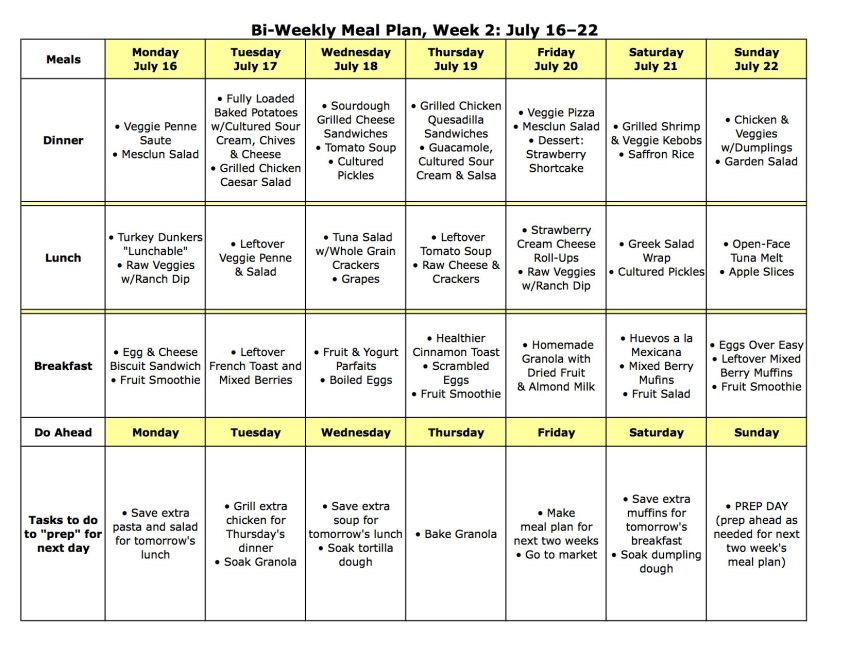Proper nutrition is the foundation of a healthy lifestyle. One of the key components of maintaining a balanced diet is meal planning. By carefully selecting and preparing meals, you can ensure that your body receives all the necessary nutrients it needs to function optimally. In this article, we will explore the importance of meal planning and provide you with some useful tips to create a well-rounded meal plan.
Why is Meal Planning Important?
Meal planning plays a crucial role in achieving and sustaining a balanced diet. Here are a few reasons why it is essential:
Ensures Nutrient Variety: Planning your meals in advance allows you to incorporate a diverse range of nutrients into your diet. By including different food groups such as fruits, vegetables, whole grains, lean proteins, and healthy fats, you can ensure that your body receives a wide array of essential vitamins, minerals, and antioxidants.
Avoids Impulse Eating: With a well-thought-out meal plan, you are less likely to give in to impulsive food choices. Having pre-planned meals ensures that you have healthy options readily available, reducing the temptation to resort to convenient yet unhealthy fast food alternatives.
Saves Time and Money: Meal planning helps you save time by minimizing last-minute decisions about what to eat. Additionally, it can save you money by reducing food waste. By planning your meals effectively, you can buy groceries in appropriate quantities, reducing the chances of perishable items going to waste.
Aids in Weight Management: With a well-balanced meal plan, you can control portion sizes and monitor your calorie intake. This can be especially beneficial for individuals who are looking to lose or maintain weight.
Promotes Healthy Habits: Meal planning encourages mindful eating and instills healthier habits. By dedicating time to plan and prepare your meals, you become more conscious of what goes into your body, leading to better overall nutritional choices.
Tips for Creating a Well-Rounded Meal Plan
Follow these guidelines to help you develop a well-rounded meal plan:
Include a Variety of Food Groups: Aim to incorporate all major food groups into your meal plan. These include fruits, vegetables, whole grains, lean proteins, dairy or dairy alternatives, and healthy fats.
Portion Control: Pay attention to portion sizes to avoid overeating. Use measuring cups or a food scale to accurately portion your meals.
Pay Attention to Macronutrients: Ensure that your meals contain an appropriate balance of carbohydrates, proteins, and fats. This balance will provide your body with sustained energy throughout the day.
Choose Nutrient-Dense Foods: Opt for foods that are rich in nutrients and low in added sugars and unhealthy fats. Incorporate whole fruits and vegetables, lean proteins, whole grains, and nuts into your meal plan.
Meal Prep: Dedicate a specific day of the week to meal prep. Prepare and portion your meals in advance, so they are easy to grab when you’re busy. Consider batch cooking to save time.
Listen to Your Body: Pay attention to your hunger and fullness cues. Adjust portion sizes and the number of meals you consume based on your individual needs.
Stay Hydrated: Remember to incorporate water into your meal plan to stay adequately hydrated throughout the day. Limit your consumption of sugary drinks.
Sample Meal Plan
Here’s an example of a well-balanced meal plan for a day:
Breakfast: Whole grain toast topped with avocado slices and a poached egg, accompanied by a side of mixed berries.
Lunch: Grilled chicken breast with quinoa and steamed broccoli, seasoned with herbs and olive oil.
Snack: Greek yogurt with a handful of almonds and a drizzle of honey.
Dinner: Baked salmon with roasted sweet potatoes and a side salad of mixed greens.
Evening Snack: Sliced apple with almond butter.
Remember that this is just a simple example, and your meal plan can be tailored to your personal preferences and dietary restrictions.
In Conclusion
Meal planning is a powerful tool to ensure you consume a balanced diet consistently. By including a variety of food groups, paying attention to portion sizes, and making nutrient-dense choices, you can take control of your nutrition and optimize your overall well-being. Start incorporating meal planning into your routine today, and reap the benefits of a healthier lifestyle!

